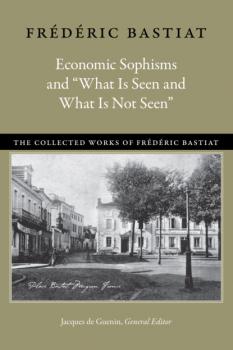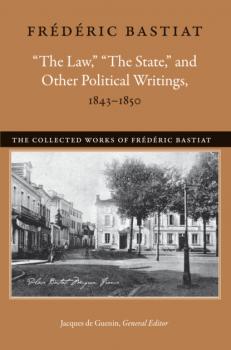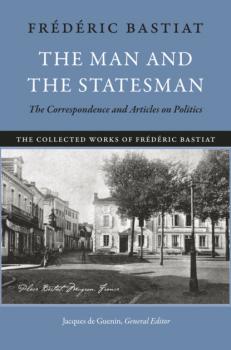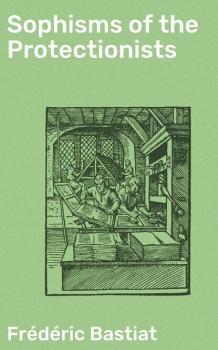Bastiat Frédéric
Список книг автора Bastiat FrédéricEconomic Sophisms and “What Is Seen and What Is Not Seen”
This volume, the third in our Collected Works of Frédéric Bastiat, includes two of Bastiat’s best-known works, the collected Economic Sophisms and the pamphlet What Is Seen and What Is Not Seen. We are publishing here for the first time in English the Third Series of Economic Sophisms, which Bastiat had planned but died before he could complete the project.Both Economic Sophisms and What Is Seen and What Is Not Seen share similar stylistic features and were written with much the same purpose in mind, to disabuse people of misperceptions they might have had about the benefits of free trade and free markets. Throughout the book, Bastiat’s clever and witty arguments against tariff protection and subsidies to domestic industry are timeless, as governments and vested-interest groups are still advocating the same policies 160 years after Bastiat wrote.Frédéric Bastiat was born in 1801, and during his short life (he died in Rome, on Christmas Eve, in 1850) he was witness to many historic events, such as the victory of Richard Cobden’s free-trade Anti–Corn Law League in 1846, the rise of socialism, the 1848 Revolution, and the rise of Louis Napoléon to the presidency of the Second Republic. Many of these events affected his ideas and became targets of his writings. In his final work, What Is Seen and What Is Not Seen, completed only months before his death, he provides one of his keenest economic insights, that, although there are obvious beneficial effects of government interventions at first, that is, the “seen,” there are also the “unseen” consequences, for example, in the form of opportunity costs that are ignored but that often have deleterious economic effects. He makes this case most eloquently in the form of a parable in the opening chapter, “The Broken Window.”To accompany Bastiat’s original works, we have provided detailed and comprehensive explanatory footnotes, glossaries, and appendixes. Bastiat refers to dozens of other writers and politicians and is critical of French government policies regarding taxation, tariffs, and subsidies to business. The glossary of authors and politicians provides detailed information about the individuals Bastiat mentions in his essays, the views they held, the books they published, and the laws that the French state enacted in order to maintain the system of protection and subsidies that Bastiat and the other free-market economists so strenuously opposed. This collection of supplementary material allows us a better understanding of the community of economists and politicians of which Bastiat was a part in the late 1840s.Jacques de Guenin founded the Cercle Frédéric Bastiat in 1990. He had degrees in science from the University of Paris and from the University of California, Berkeley, and was the author of The Logic of Classical Liberalism.Dennis O’Keeffe was Professor of Social Science at the University of Buckingham and Senior Research Fellow in Education at the Institute of Economic Affairs, London.Jean-Claude Paul-Dejean is a Bastiat scholar and a historian at the University of Bordeaux.David M. Hart has a Ph.D. in history from King’s College, CambriEAe, and is the Director of Liberty Fund’s Online Library of Liberty.
“The Law,” “The State,” and Other Political Writings, 1843–1850
“The Law,” “The State,” and Other Political Writings, 1843–1850, collects nineteen of Bastiat’s “pamphlets,” or articles, ranging from the theory of value and rent, public choice and collective action, government intervention and regulation, the balance of trade, education, and trade unions to price controls, capital and growth, and taxation. Many of these are topics still relevant and debated today.In addition, this edition also contains footnotes and glossary entries that help explain the political, economic, and intellectual context in which Bastiat lived and worked. Filling gaps on Bastiat and his philosophy, this volume features articles that have never before been translated in English.Frédéric Bastiat (1801–1850) was one of the leading advocates of free markets and free trade in the mid-nineteenth century.Pascal Salin is Emeritus Professor of Economics, Paris University, and former president of the Mont Pelerin Society. He is the author of Libéralisme; Français, n’ayez pas peur du libéralism; and Revenir au capitalisme, pour éviter les crises.Jacques de Guenin is founder of the Cercle Frédéric Bastiat. He is a graduate of the École des Mines in Paris and holds a Master of Sciences from the University of California, Berkeley.Dennis O’Keeffe is Professor of Social Science at the University of Buckingham, Buckingham, England, and is Senior Research Fellow in Education at the Institute of Economic Affairs, London.David M. Hart has a Ph.D. in history from King’s College, CambriEAe, and is the Director of Liberty Fund’s Online Library of Liberty. Please note: This title is available as an ebook for purchase on Amazon, Barnes and Noble, and iTunes.
The Man and the Statesman
The Man and the Statesman, the first volume in Liberty Fund’s six-volume series, may be considered the most complete edition of Bastiat’s works published to date, in any country, and in any language. The main source for this translation is the seven-volume Œuvres complètes de Frédéric Bastiat, published in the 1850s and 1860s.The present volume, most of which has never before been translated into English, includes Bastiat’s complete correspondence: 207 letters Bastiat wrote between 1819, when he was only 18 years old, until just a few days before his untimely death in 1850 at the age of 49. For contemporary classical liberals, Bastiat’s correspondence will provide a unique window into a long-forgotten world where opposition to war and colonialism went hand-in-hand with support for free trade and deregulation.Frédéric Bastiat (1801–1850) was one of the leading advocates of free markets and free trade in the mid-nineteenth century.Jacques de Guenin is founder of the Cercle Frédéric Bastiat. He is a graduate of the École des Mines in Paris and holds a Master of Sciences from the University of California, Berkeley.Dennis O’Keeffe is Professor of Social Science at the University of Buckingham, Buckingham, England, and is Senior Research Fellow in Education at the Institute of Economic Affairs, London.David M. Hart has a Ph.D. in history from King’s College, CambriEAe, and is the Director of Liberty Fund’s Online Library of Liberty. Please note: This title is available as an ebook for purchase on Amazon, Barnes and Noble, and iTunes.
The Law
First published in 1850, “The Law” is the best known work of 19th century economist Frederic Bastiat, a prominent member of the French Liberal School. A forerunner to the Austrian School of Economics, the French Liberal School was a major proponent of the laissez-faire capitalistic system. Bastiat advocated for unregulated free markets and against protectionism. At the heart of Bastiat’s philosophy was an opposition against the redistribution of wealth by the government, which he refers to as “legal plunder”, for any reason. In Bastiat’s opinion the sole purpose of the government was to protect personal property and liberty. Influenced by John Locke’s “Second Treatise on Government”, this short little book may seem extreme in its defense of personal property by today’s standards. Bastiat in fact opposes such commonly accepted modern day practices as public education. Bastiat’s absolutist position is understood when one learns of his personal history, his father’s estate was acquired during the French Revolution. While history may ultimately deem Bastiat as nothing more than a reactionary, his contribution to modern economics, which includes the concept of opportunity cost, and his influence on modern political economy cannot be overstated. This edition follows the translation of Dean Russell.









